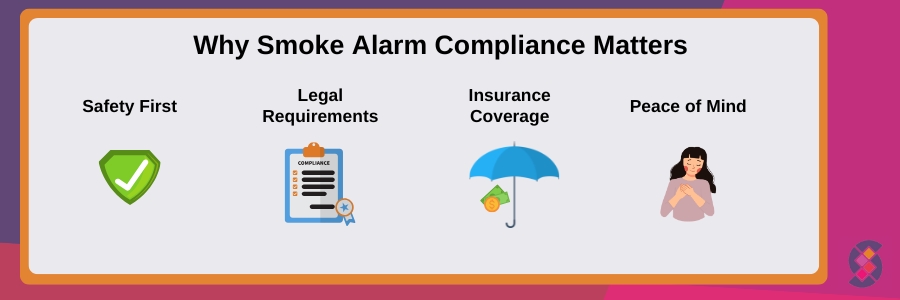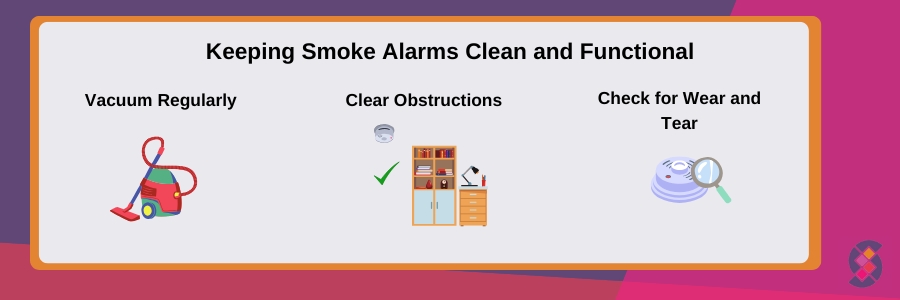Who takes care of smoke alarms in strata units?
Smoke alarms are the first line of defence in the home against the signs of fire — ensuring that they are kept in good working condition can mean the difference between life and death for you and your loved ones. For residential properties, it’s generally understood that owners are responsible for the installation and maintenance of smoke alarms within the property.
When it comes to strata properties, however, the responsibility of installing smoke alarms in different areas can be complicated by shared ownership arrangements. If you’re a new tenant in a strata unit or a strata owner looking for the answers on who is responsible for smoke alarm installation and maintenance, we’re here to help.
What are the laws for smoke alarms in strata units?
All residential properties in Australia are legally required to have an adequate number of working smoke alarms installed within the premises.
Strata properties are multi-unit dwellings, which means they are categorised as Class 2 buildings under the National Construction Code (NCC) building classifications. Under the regulations of the Development Act, 1993 (regulation 76B), Class 1 and 2 buildings are required to be fitted with smoke alarms, meaning that both strata units and the property as a whole are required to have working smoke alarms.

Who is responsible for smoke alarms in strata units?
In South Australia, strata owners are responsible for the installation and working condition of smoke alarms in strata units. If the strata unit is assigned to a property management service by the owner, the property manager may be responsible for the maintenance of the smoke alarms.
Smoke alarms must be tested regularly (at least once a month) to ensure that they are still in good working order. These tests can be arranged by the owner and require access to the residence. Stata owners who fail to install the right type of smoke alarm or do not maintain smoke alarms in working order may face fines of up to $750. Not having working smoke detectors in the strata unit may result in limited coverage from insurance providers in the event of fire damage to the property.
While this means that strata tenants are not directly responsible for smoke alarms, they still have a part to play in ensuring their own safety. Tenants should cooperate with owners, landlords, and property managers to allow for smoke alarm maintenance as well as notify the owners when smoke alarms are found to be faulty or broken.
Installation requirements for different types of smoke alarms
For strata properties that have obtained building approval on or after 1 January 1995, fitted smoke alarms must be directly connected to the property’s 240-volt main power supply. In addition to the hard-wired connection, smoke alarms must also have a backup battery to remain operable in the event of a power outage.
Strata properties that have existed before 1 January 1995 are required to have smoke alarms that are fitted with a replaceable battery. However, for strata units that have had a change in ownership on or after 1 February 1998, new owners are required to install smoke alarms that are either hard-wired to the main power supply or powered by 10-year non-replaceable, non-removable, permanently connected batteries. New owner must complete the installation of the new smoke alarms within 6 months of the title transfer.
From 1 May 2014, smoke alarms within strata units are also required to be interconnected — this arrangement allows all of the smoke alarms within the home to be triggered when one of the smoke alarms is set off. This increases the likelihood of all residents within the unit to hear the alarm and take the necessary actions for dealing with the source of the smoke, or if necessary, evacuate the unit.

Are smoke alarms installed on common property?
Yes. Common areas outside strata units such as corridors, staircases, shared facilities must be equipped with smoke alarms. As these areas are collectively owned by all strata owners, the Body Corporate is responsible for the installation and maintenance of smoke alarms in common property.
In SA, residential body corporations are excluded from having to comply with much of the Work Health and Safety Regulations that apply to other commercial multi-unit buildings. However, laws pertaining to the Development Act and the Duty of Care/Common Law may still apply to fire safety requirements in the property.
In addition, some apartment buildings may also have a fire alarm system that integrates smoke alarms in common areas, and private areas with a fire panel linked to the fire department. Even in this situation, the smoke alarms on the common property are the responsibility of the Body Corporate and the smoke alarms in private apartments are the responsibility of the apartment owner. In practice, sometimes a strata management company is alerted to a faulty smoke alarm in a private unit, and will alert that owner or property manager who then must attend to its repair.
Knowing the reasonable level of legal compliance that applies to each body corporate can be tricky, which is why strata management services like Strata Data are engaged to provide the right advice and solutions on behalf of individual lot owners, and the Body Corporate.



